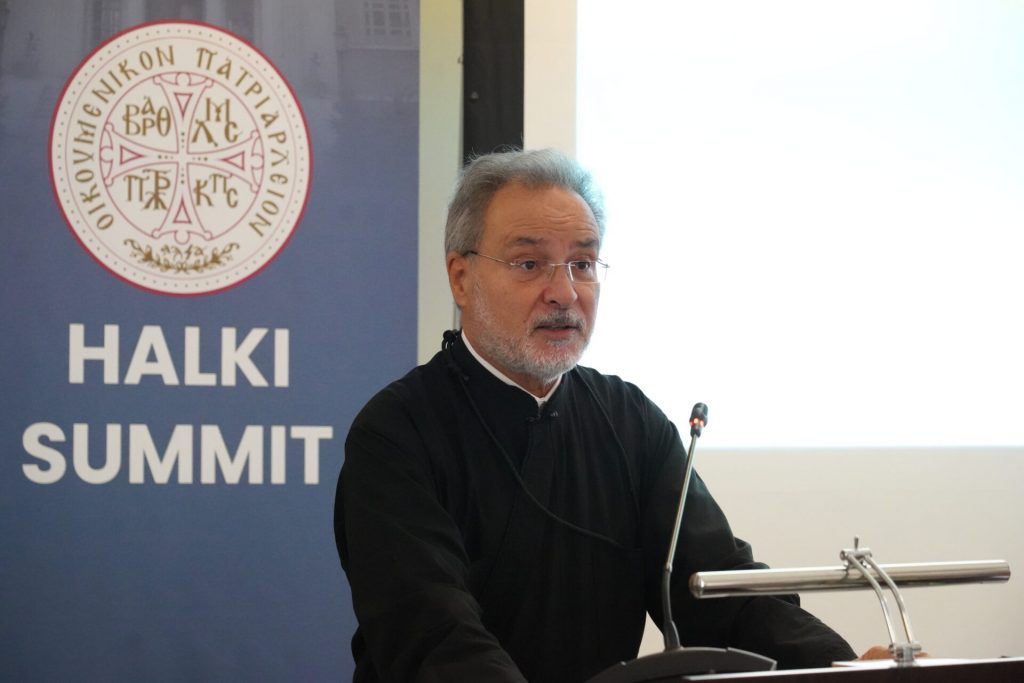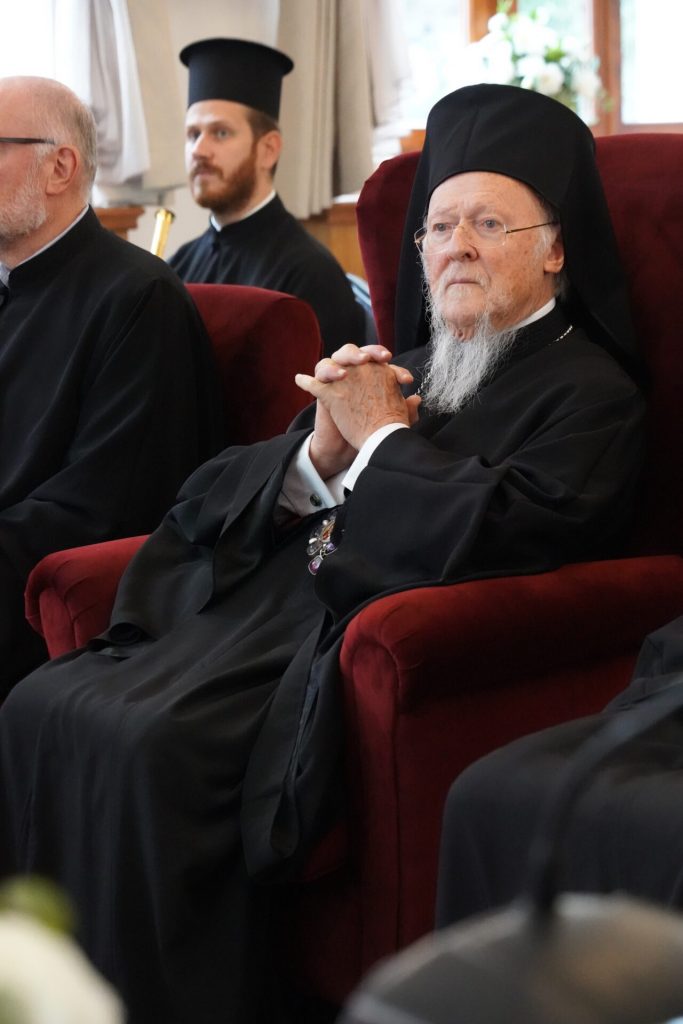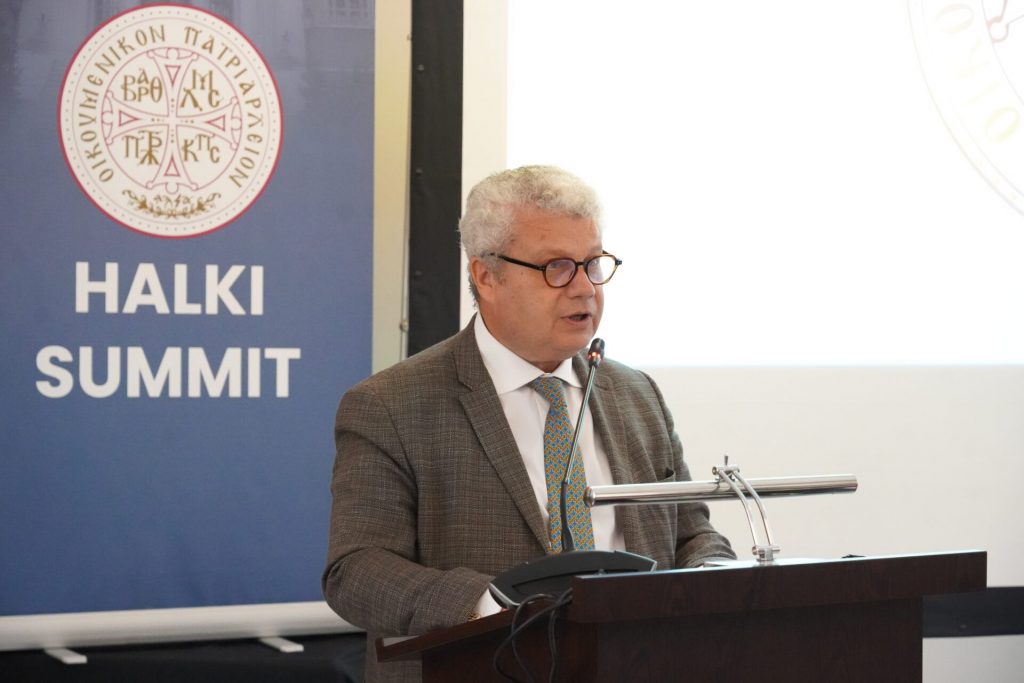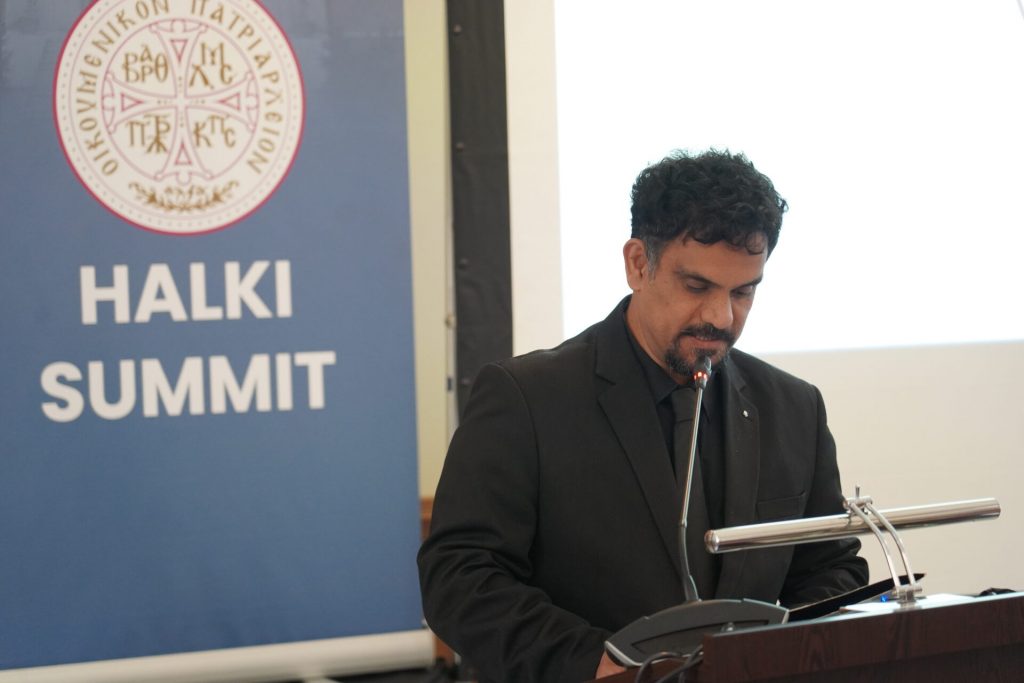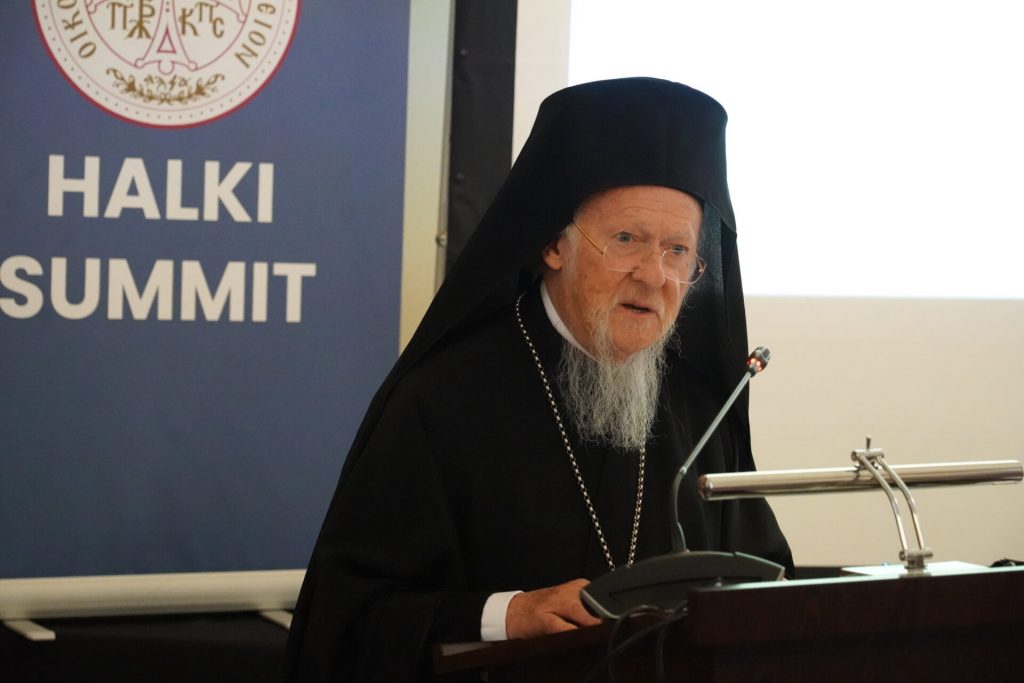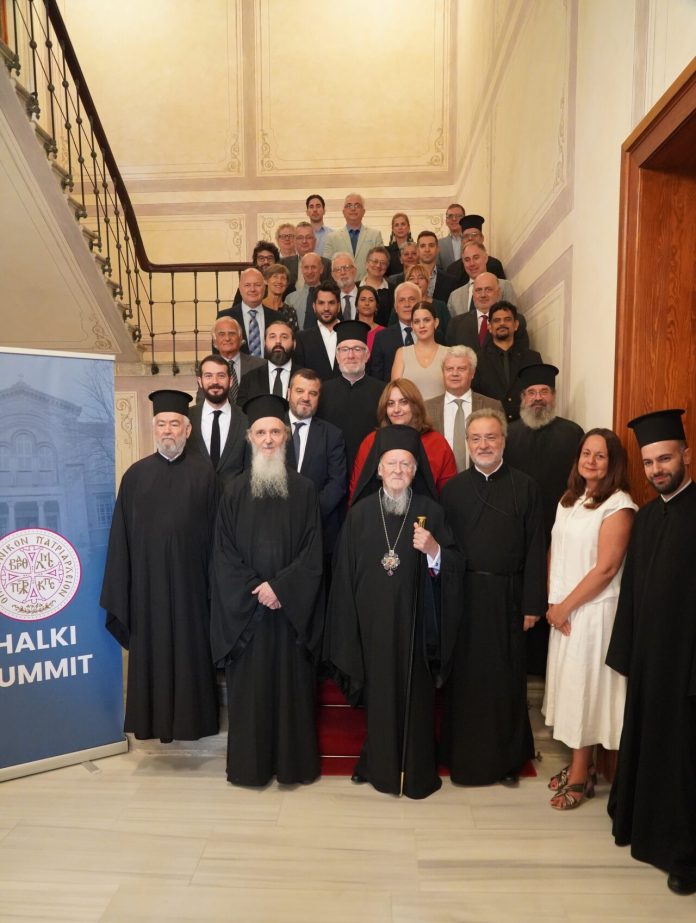Η Α.Θ. Παναγιότης ο Οικουμενικός Πατριάρχης κ.κ. Βαρθολομαίος, το πρωί της Παρασκευής, 30 Αυγούστου 2024, πριν από τη συνεδρία της Αγίας και Ιεράς Συνόδου, κήρυξε την έναρξη των εργασιών του Διεθνούς Οικολογικού Συνεδρίου “Halki Summit VI”, με θέμα: “Ύδωρ: πνεύμα και επιστήμη”, στην Αίθουσα εκδηλώσεων της προσφάτως ανακαινισμένης Πατριαρχικής Αστικής Σχολής Μαρασλή, παραπλεύρως του κτηριακού συγκροτήματος του Πατριαρχείου.
Στην ομιλία του, που εκφώνησε στην αγγλική γλώσσα, ο Παναγιώτατος υπενθύμισε ότι ο αοίδιμος προκάτοχός του, Οικουμενικός Πατριάρχης κυρός Δημήτριος, καθιέρωσε την 1η Σεπτεμβρίου, ημέρα της ενάρξεως του εκκλησιαστικού έτους, ως την επίσημη ημέρα προσευχής υπέρ της προστασίας της Δημιουργίας του Θεού. Έκτοτε, συνέχισε, οι Αυτοκέφαλες Ορθόδοξες Εκκλησίες και, στη συνέχεια, άλλες χριστιανικές ομολογίες — αλλά και το Παγκόσμιο Συμβούλιο Εκκλησιών και το Συμβούλιο των Ευρωπαϊκών Εκκλησιών, και πιο πρόσφατα η Αγγλικανική Κοινωνία και η Ρωμαιοκαθολική Εκκλησία— υιοθέτησαν αυτή την πρωτοβουλία. Στη συνέχεια αναφέρθηκε στις οικολογικές πρωτοβουλίες του Πατριαρχείου, μεταξύ των οποίων και 9 εν πλω διεπιστημονικά Οικολογικά Συμπόσια, σε διάφορα απειλούμενα υδάτινα οικοσυστήματα του πλανήτη. Αναφερόμενος στο παρόν Συνέδριο “Halki Summit VI”, ο Πατριάρχης επεσήμανε ότι προωθεί και συμπυκνώνει αυτή την συσσωρευμένη ανεκτίμητη εμπειρία και οι σύνεδροι θα έχουν την ευκαιρία να ασχοληθούν με ένα ευρύ φάσμα θεολογικών και επιστημονικών θεμάτων που αφορούν στο νερό και στη σημασία του για τον άνθρωπο.
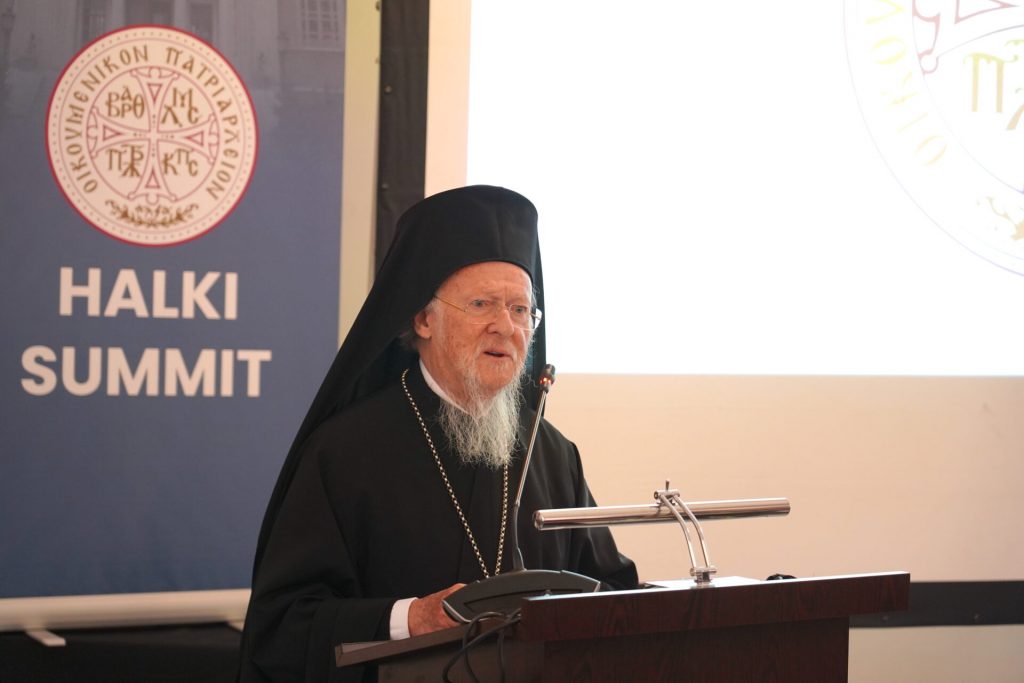
“Το νερό ήταν πάντα κάτι περισσότερο από μια απλή φυσική ανάγκη. Έχει ριζωθεί βαθιά στην πνευματική και θρησκευτική συνείδηση της ανθρωπότητας. Σε διάφορους πολιτισμούς και θρησκείες, το νερό έχει γίνει αντιληπτό ως σύμβολο της ζωής”, τόνισε ο Παναγιώτατος, και αφού αναφέρθηκε εκτενώς στη σημασία που αποδίδει στο νερό ο Χριστιανισμός, αναφέρθηκε στις σύγχρονες προκλήσεις που αντιμετωπίζει ο κόσμος σήμερα για την προστασία και ορθή διαχείρισή του.
“Το νερό έχει γίνει κυριολεκτικά ένας κρίσιμος πόρος στην εποχή μας. Αναγνωρίζουμε ότι το νερό είναι απαραίτητο για τη ζωή, υποστηρίζοντας την υγεία, την επισιτιστική ασφάλεια, την οικονομική ευημερία και την περιβαλλοντική βιωσιμότητα. Ωστόσο, παρά αυτή τη θεμελιώδη και ζωτική σημασία, αντιμετωπίζουμε τώρα μια κλιμακούμενη παγκόσμια κρίση νερού, η οποία απαιτεί άμεση προσοχή και συλλογική προσέγγιση. Παγκοσμίως, πάνω από δύο δισεκατομμύρια άνθρωποι δεν έχουν πρόσβαση σε ασφαλές πόσιμο νερό και περισσότερα από τέσσερα δισεκατομμύρια αντιμετωπίζουν τακτικά σοβαρή λειψυδρία. Τα δεδομένα είναι συγκλονιστικά και υπογραμμίζουν την επιτακτική ανάγκη να αντιμετωπιστεί η δίκαιη προσβασιμότητα στο νερό, η ποιότητα του νερού και η βιωσιμότητα των υδάτινων πόρων. Επιπλέον, η έλλειψη καθαρού νερού επηρεάζει δυσανάλογα τους ευάλωτους πληθυσμούς, επιδεινώνοντας περαιτέρω την ανισότητα και εμποδίζοντας την ισόρροπη ανάπτυξη.
Με την ίδια λογική, η κλιματική αλλαγή εντείνει την κρίση του νερού αλλάζοντας την κατανομή των βροχοπτώσεων, αυξάνοντας τη συχνότητα και τη σοβαρότητα των ξηρασιών και των πλημμυρών, ενώ ταυτόχρονα επιταχύνει το λιώσιμο των παγετώνων. Αυτές οι αλλαγές διαταράσσουν τη διαθεσιμότητα και τη διανομή των πόρων γλυκού νερού, απειλώντας εξίσου τα οικοσυστήματα και τις ανθρώπινες κοινότητες.”
Όπως είπε ο Παναγιώτατος, καθώς ο παγκόσμιος πληθυσμός συνεχίζει να αυξάνεται, η ζήτηση για τροφή —και, επομένως, για νερό— θα αυξηθεί δραστικά, και επεσήμανε ότι οι αποτελεσματικές και καινοτόμες πρακτικές διαχείρισης του νερού και οι βιώσιμες τεχνικές καλλιέργειας είναι ζωτικής σημασίας για τη διασφάλιση της επισιτιστικής ασφάλειας χωρίς να εξαντλούνται οι πόροι γλυκού νερού. Σημείωσε δε, ότι “μόνο με συλλογική δράση και καινοτόμες λύσεις θα αντιμετωπίσουμε τις προκλήσεις για τον σεβασμό του νερού ως ουσιαστικού συστατικού της ζωής στη γη και της σωτηρίας στον ουρανό. Μαζί, μπορούμε να προστατεύσουμε και να διατηρήσουμε αυτόν τον πολύτιμο πόρο για τις σημερινές και τις μελλοντικές γενιές”.
Προηγουμένως, τον Παναγιώτατο και τους συνέδρους καλωσόρισε ο Ιερολ. Αρχιδιάκονος του Οικουμενικού Θρόνου κ. Ιωάννης Χρυσαυγής, υπεύθυνος για την οργάνωση του Συνεδρίου, ενώ σύντομους χαιρετισμούς απηύθυναν οι Ελλογιμ. Καθηγητές Ιωάννης Καλαβρουζιώτης, Πρόεδρος του Ελληνικού Ανοικτού Πανεπιστημίου, σε συνεργασία με το οποίο διεξάγεται το “Halki Summit VI”, και Volkan Oral, από το Istanbul Aydin University.
Στην εναρκτήρια συνεδρία παρέστησαν Ιεράρχες, κληρικοί, θεολόγοι, Πανεπιστημιακοί Καθηγητές, ειδικοί επιστήμονες και στελέχη Ιδρυμάτων και Οργανισμών, ενώ οι εργασίες του Συνεδρίου, την δεύτερη ημέρα, θα συνεχιστούν στην Ιερά Θεολογική Σχολή της Χάλκης.
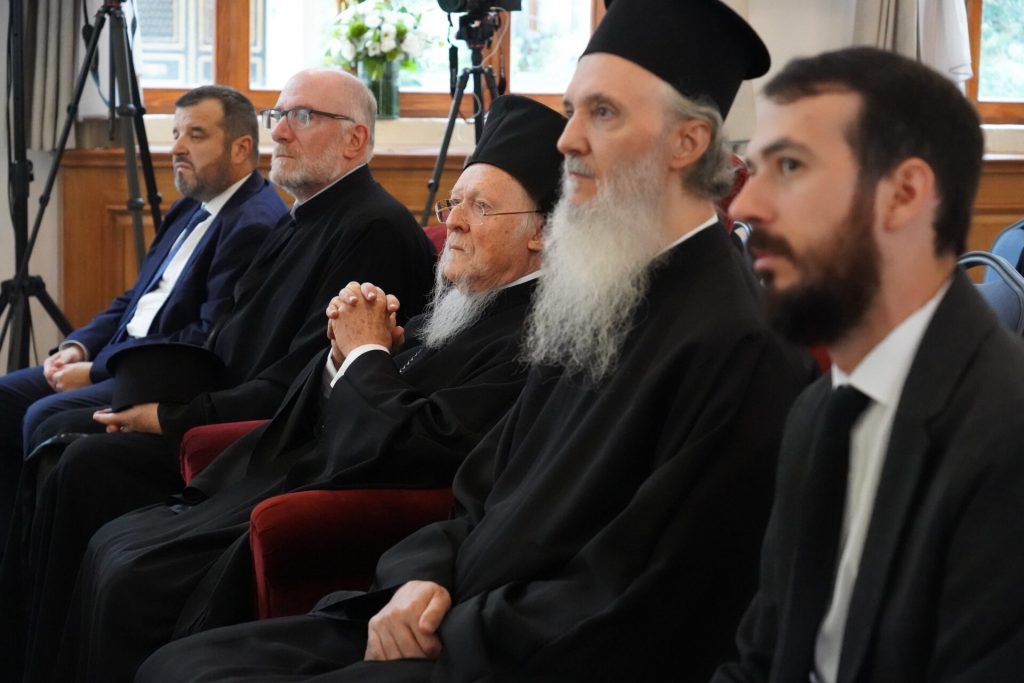
WATER: SPIRIT AND SCIENCE – Keynote Address by His All-Holiness Ecumenical Patriarch Bartholomew (Halki Summit VI, Istanbul, August 30, 2024)
INTRODUCTION
Venerable Hierarchs,
Distinguished participants and guests,
It is a privilege and pleasure to be addressing this opening session of the 6th Halki Summit, dedicated this year to the subject of water in its spiritual and scientific dimensions. And it is with paternal joy and satisfaction that we welcome you to the Phanar as the sacred See of the Orthodox Church, which has initiated an exhaustive and comprehensive series of pioneering and inspiring events for the sake of raising awareness and disseminating knowledge about the preservation and protection of the unique gift of God’s creation. All of you bring specific and special talents toward this end, and it is our earnest hope and prayer that this summit will once again forge new friendships and relationships, while expanding and extending invaluable networks in a world that is hungry for such encounters and relationships.
As you know, the involvement of the Ecumenical Patriarchate in caring and praying for the natural environment dates back to 1989, when our late predecessor, Ecumenical Patriarch Demetrios, established September 1st, the Day of Indiction, as the formal day of intercessions for God’s creation. Since then, all Orthodox Churches and, subsequently, other Christian confessions—but also the World Council of Churches and the Conference of European Churches, and more recently the Anglican Communion and the Roman Catholic Church—have adopted this universal feast and commemoration.
Since that time, the ecological initiatives of the Ecumenical Patriarchate have included events with the late Prince Philip, Duke of Edinburgh, and especially a sequence of five inter-Orthodox Summer Seminars, nine interdisciplinary Ecological Symposia at sea, and now six international Halki Summits. You are, therefore, all of you, part of a long succession of dedicated gatherings, which have assembled countless religious, civil, and political leaders, theologians and scientists, journalists and activists, women and men, who have convened from all parts of the globe: from the Amazon River and the Adriatic Sea, to the Arctic Ocean and the Black Sea, as well as from the Baltic to the Mediterranean Sea. Today, Halki Summit VI is advancing this invaluable and inclusive tradition.
Our esteemed speakers will address a broad range of theological and scientific aspects of water. You will hear about the significance and sacredness of water in classical Greece, in the holy Scriptures, and in the liturgical Services. You will learn about spiritual and educational dimensions of water, as well as about water in recent history, in sustainable development, and solutions for management. And you will be informed about specific responses to issues related to water in Greece and the Netherlands. Throughout, we encourage you to seek avenues of collaboration and partnership. This is precisely what lies behind our precious co-sponsorship and cooperation with the Hellenic Open University this year, for which we are grateful to its President, Prof. Ioannis Kalavrouziotis.
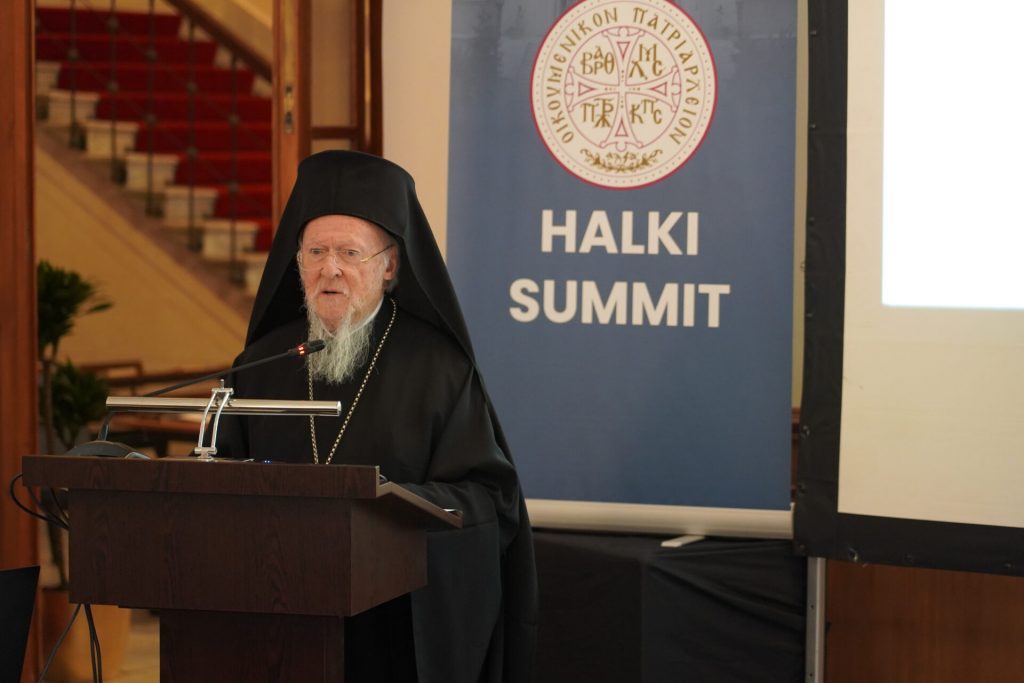
WATER IN CHRISTIANITY AND BYZANTIUM
Dear friends,
Water has always been more than just a physical necessity. It has been deeply embedded in the spiritual and religious consciousness of humanity. Across various cultures and religions, water has been perceived as a symbol of life. In Christianity, it signifies purification, regeneration, and initiation. Christ’s baptism in the Jordan River marks the beginning of his ministry and the blessing of the entire universe. In Judaism, water is a central part of feasts and laws. And in Islam, water is considered a gift from the divine and a sign of sustenance. Rites of washing are fundamental in all three of these Abrahamic religions. Moreover, as we have repeatedly emphasized, but as we particularly underlined during our symposium on the Amazon in 2006, indigenous and tribal religions around the world understand water bodies such as rivers, lakes, and springs as inhabited by spirits or deities.
However, let us focus here on the perception of water in Christianity and Byzantium. We have already noted that water is at the heart of the sacrament of Baptism, which symbolizes the washing away of the Old Adam and the rebirth into the New Adam. In his epistles, the Apostle Paul further elaborates on the significance of baptism, when he writes in Romans, chapter 6: “Do you not know that all of us who were baptized into Christ Jesus were baptized into his death? We were therefore buried with him through baptism into death in order that, just as Christ was raised from the dead through the glory of the Father, we too may live a new life.” (verses 3–4). Here, St. Paul highlights the transformative power of Baptism. The roots of this conviction lie in the Book of Leviticus in the Old Testament, where water is used in cleansing rituals for those who seek restoration in spiritual cleanliness. For us, of course, Christ Himself is the “living water” and “whoever drinks from this water will never thirst. Indeed, this water will become a spring of water unto eternal life” (John 4.14). Moreover, water plays a crucial role in several of Christ’s miracles, foremost in the first of His public signs, namely at the changing of water into wine at the wedding in Cana (John 2.1–11), which prefigures Christ’s transformative ministry through the Eucharist. Even in the last Book of the Bible, the Book of Revelation, water holds vital importance with the vision of the River of Life that portrays the ultimate fulfilment of God’s promise of salvation for the whole world: “Then the angel showed me the river of the water of life, as clear as crystal, flowing from the throne of God and of the Lamb down the middle of the great street of the city. On each side of the river stood the tree of life, bearing twelve crops of fruit, yielding its fruit every month. And the leaves of the tree are for the healing of the nations” (Rev. 22.1–2).
It is no wonder, then, that water was of essential value in the religious, artistic, and cultural identity of Byzantium. Beyond the importance of Baptism, along with the religious depictions of Christ’s Baptism in frescoes and mosaics, all of which reinforced the sacred nature of water, Byzantium (and especially its capital Constantinople) was renowned for its advanced engineering in water management. The city was equipped with sophisticated aqueducts, cisterns, and public fountains, showcasing the Byzantines’ ability to harness and utilize water effectively and just. One of the most remarkable examples is the Basilica Cistern, an enormous underground reservoir built in the 6th century during the reign of Emperor Justinian I. The architectural ingenuity of the cistern, with its forest of marble columns, not only served practical needs, but also reflected the aesthetic and cultural values of the time. You will have the opportunity personally to witness many of the surviving remnants of this legacy as you travel around the city. But water also held a prominent place in Byzantine literature and poetry, where water was frequently used as a metaphor for life, purity, and the divine. Byzantine hymnographers often referred to water, drawing on its biblical connotations and its importance in the sacraments. In Byzantine iconography, water also symbolized both life and death, often depicted as the life-giving boundary between the earthly and the divine, for instance in depictions of the Last Judgment.
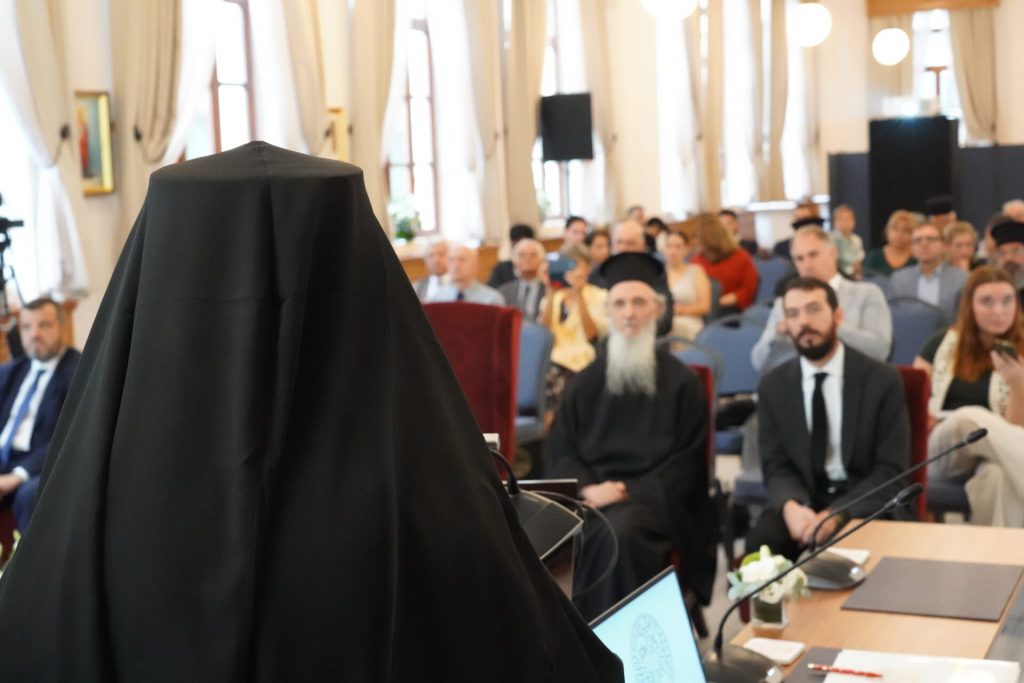
THE MODERN CRISIS OF WATER
Beloved participants and guests,
While we remember the sacred and historical perspectives of water, we must also address—in fact, we should, because of the emergency crisis— the contemporary challenge of water that we encounter in the world today. Water has literally become a critical resource in our age. We recognize that water is essential for life, underpinning health, food security, economic prosperity, and environmental sustainability. However, despite this fundamental and vital importance, we are now facing an escalating global water crisis that demands immediate attention and collective approach. Globally, well over two billion people lack access to safe drinking water, and more than four billion regularly experience severe water scarcity. The data is staggering and highlights the compelling need to address equitable water accessibility, water quality, and water sustainability. Moreover, the scarcity of clean water disproportionately affects vulnerable populations, further exacerbating inequality and hindering balanced development.
By the same token, climate change is intensifying the water crisis by altering precipitation patterns, increasing the frequency and severity of droughts and floods, while at the same time accelerating the melting of glaciers. These changes disrupt the availability and distribution of freshwater resources, threatening ecosystems and human communities alike. For example, the shrinking of glaciers reduces water supplies for millions who rely on glacial melt for drinking water and agriculture. In addition to this, agriculture accounts for approximately 70 percent of global freshwater usage. Yet, as the global population continues to grow, the demand for food—and, therefore, water—will increase drastically. Efficient water management practices and sustainable agricultural techniques are crucial to ensure food security without depleting our freshwater resources. And there are so many other collateral damages provoked by rapid urbanization and industrialization, which further strain water resources. Cities around the world are expanding, and with this growth comes increased water demand for domestic, industrial, and infrastructural use. Many urban areas struggle with aging water infrastructure, leading to significant water loss and contamination. Addressing these challenges requires substantial investment in water infrastructure and innovative management practices.
Finally, on a daily basis, we all see the impact of the water crisis on the health of our planet, as well as the well-being of our fellow citizens. Water pollution is a major threat to human health and ecosystems. Industrial discharges, agricultural runoff, and untreated sewage contaminate water bodies, making them unsafe for consumption and harming aquatic life. Contaminated water is a breeding ground for diseases, contributing to the deaths of millions of people each year, particularly children. Ensuring access to clean water and sanitation is not just a matter of infrastructure, but also of public health. At the same time, water scarcity and poor water quality have profound economic implications. Industries dependent on water, such as agriculture, energy production, and manufacturing, face disruptions that can lead to economic losses and job cuts. Moreover, communities without reliable water access experience reduced productivity and increased healthcare costs, perpetuating cycles of poverty.
CONCLUSION
These are the sort of issues you will be addressing this year at this Halki Summit. We have long drawn attention to water as a central focus in the climate crisis. This is not least because of the immediate and unambiguous connections and ramifications between our human body, the body of our planet, and the Body of Christ.
Whether you will speak of the sacredness of water or about the sustainability of water; whether you will speak about healing through water or efficiency through management of water; whether you will stress the dimension of the heavenly kingdom or investment in earthly infrastructure; whether you discuss salvation or conservation, prayer for or protection of water; in the end, you are remembering and reminding each other that water is an urgent resource that requires our immediate and constant attention. It is only with collective action and innovative solutions that we will address the challenges of respecting water as an essential component of life on earth and salvation in heaven. Together, we can protect and preserve this precious resource for current and future generations.
Thank you for your attention. May God bless your deliberations. And may you enjoy your visit to the Phanar and to Halki.
Φωτό: Νίκος Παπαχρήστου
